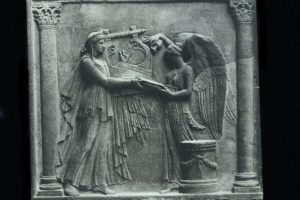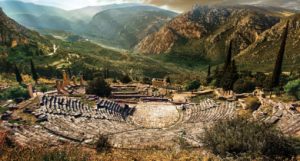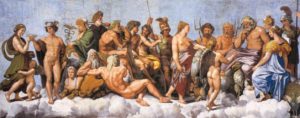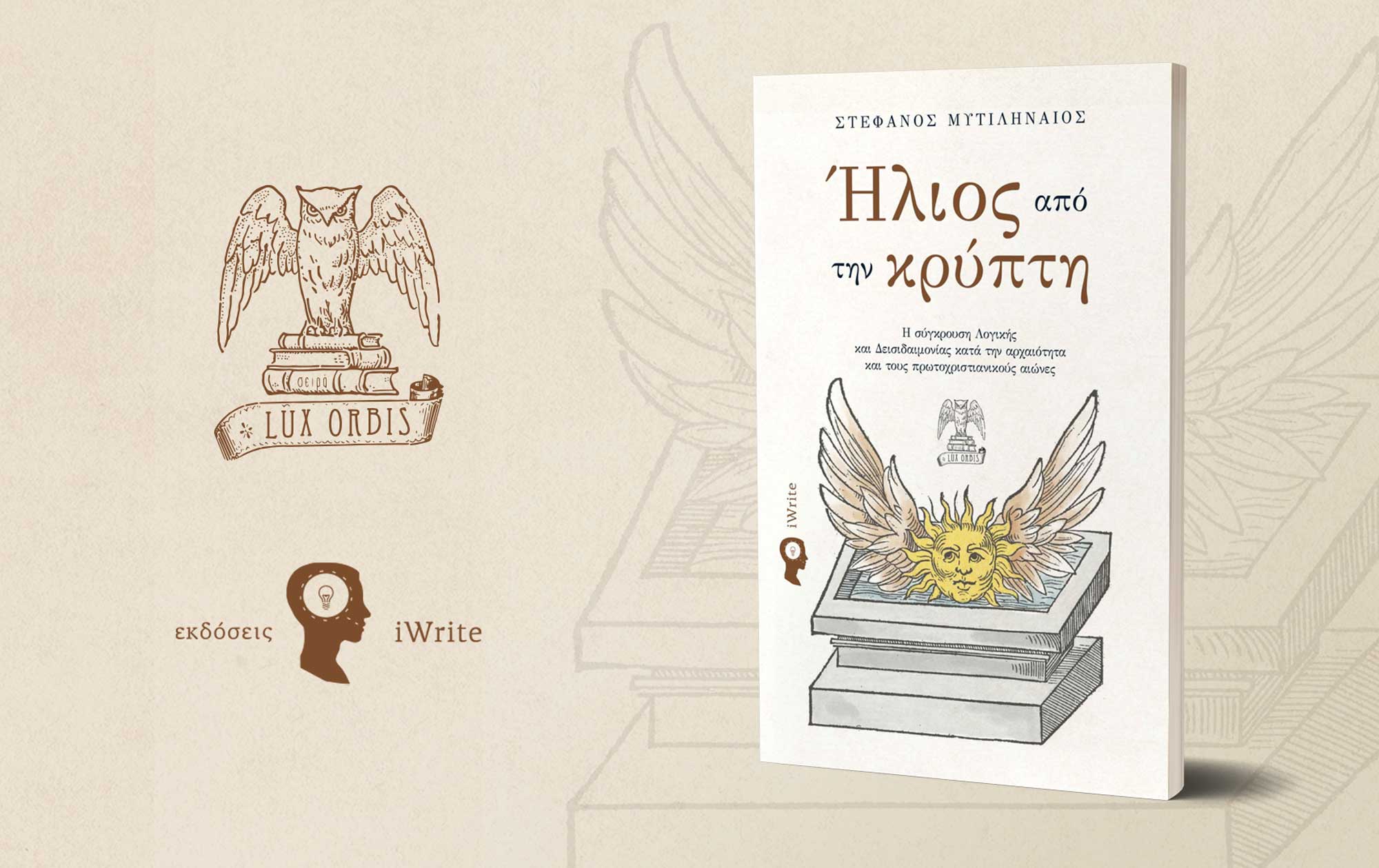Η αντίληψη των Αρχαίων Ελλήνων και η θρησκεία στην Αρχαία Ελλάδα
Η θρησκεία στην Αρχαία Ελλάδα κατά τον 7ο και τον 6ο αι. π.Χ. μαζί με τις παλαιότερες αντιλήψεις για τους θεούς, ότι ήταν βίαιες φυσικές δυνάμεις, υποχώρησαν και επικράτησε η «νέα» αντίληψη ότι οι θεοί αποτελούν ηθικές δυνάμεις και αξίες του ελληνικού κόσμου. Η αντίληψη αυτή των θεών ως ηθικών δυνάμεων είχε ως συνέπεια ότι οι άνθρωποι αισθάνονταν πολύ πιο έντονα από όσο πριν την απόσταση από το Θείον. Εκείνος που επιδιώκει να εξομοιωθεί με το Θείον, ή να εμφανιστεί ως συνομιλητής, ομοτράπεζός ή τέκνο τους, ασκεί Ύβρη (αλαζονεία) και προκαλεί τον φθόνο των θεών.
Οι επτά σοφοί με τα ηθικά γνωμικά τους, όπως «γνώθι σαυτόν», «μηδέ άγαν», «μέτρον άριστον» κ.ά. (τα οποία είχαν χαραχθεί στον πρόναο του δελφικού Ιερού), έβαλαν τις βάσεις της Ορθής Λογικής Σκέψης, η οποία πλέον διατυπώνεται από ανθρώπους που τα σκέφτηκαν από μόνοι τους, και όχι από θεόπνευστους. Έτσι, πλέον, στις ελληνικές κοινωνίες όποιος επιχειρήσει να ισχυριστεί ότι εκφράζει το θέλημα του Θείου, ότι είναι τέκνο θεού ή θεός ο ίδιος θα θεωρείται υβριστής. Με αυτόν τον τρόπο η θεοκρατία θα ακυρωθεί ως υβριστική απέναντι στο ίδιο το Θείον! Η σύλληψη της ιδέας είναι μεγαλειώδης! Δεν αναλαμβάνει η δημοκρατία ή η προοδευτική διανόηση να συγκρουστεί απευθείας με τη θεοκρατία, αλλά βάζει τους ουράνιους θεούς να την καταργήσουν!

Υπήρχε ως σύλληψη η (οργανωμένη) θρησκεία στην Αρχαία Ελλάδα;
Στην Ελλάδα των αρχαίων χρόνων, το ωφέλιμο ήταν ότι ποτέ δεν επικράτησε μία οργανωμένη θρησκεία με ενιαίο αλάθητο εξ αποκαλύψεως δόγμα. Γι’ αυτό η σωστή άποψη είναι ότι οι Έλληνες δεν είχαν καμία θρησκεία (όπως τη γνωρίζουμε και κατανοούμε σήμερα), αλλά μάλλον μία πατροπαράδοτη ευσέβεια διάχυτη από ποικίλες αντιλήψεις περί των θεών που άλλαζαν από εποχή σε εποχή, ενώ αργότερα αυτό που ονομάζουμε σήμερα «θεολογία» έγινε αντικείμενο της φιλοσοφικής έρευνας χωρίς όμως ποτέ να ισχυριστεί κανείς από τους φιλοσόφους ότι κατείχε «θεία φώτιση» όταν διατύπωνε τις απόψεις του περί του Θείου. Οι Έλληνες, τηρώντας το ηθικό παράγγελμα «μελέτη το παν», ερευνούσαν και τα περί των θεών με οδηγό τους τον Ορθό Λόγο, όπως σημειώνει ο αρχιερέας των Δελφών Πλούταρχος:
«Για τούτο η αναζήτηση της αλήθειας, και μάλιστα αυτή που αναφέρεται στους θεούς, είναι έντονη ορμή προς τη θεότητα. Η σχετική μάθηση και η έρευνα είναι όμοια κατά κάποιο τρόπο με ανάληψη ιερών καθηκόντων και έργο ιερότερο από κάθε θρησκευτική αποχή, από κάθε υπηρεσία στους ναούς και ταιριάζει κατ’ εξοχήν στη θεά την οποία εσύ υπηρετείς, που είναι εξαιρετικά σοφή και φίλη της σοφίας, όπως φαίνεται να σημαίνει και το όνομά της, μια και της ταιριάζει περισσότερο από καθετί η γνώση και η επιστήμη». Και επισημαίνει πως η επιστημονική έρευνα γύρω από το Θείον είναι πολύ πιο ιερή από τις νηστείες και τις ιερουργίες, τα λιβάνια, τα άμφια και τις υμνωδίες, «έργο ιερότερο από κάθε θρησκευτική αποχή, από κάθε υπηρεσία στους ναούς».
Ο Πεισίστρατος και ο Ορφισμός
Όμως, γύρω στον 7ο αιώνα π.Χ. εμφανίστηκε μία «αίρεση» εντός των ορίων του Ελληνισμού, η οποία αποπειράθηκε για κάποιο διάστημα να αντικαταστήσει την πατροπαράδοτη ελευθεροφροσύνη στις αντιλήψεις περί των θεών με την εισαγωγή θεόπνευστου εξ αποκαλύψεως δόγματος. Ήταν η τάση του Ορφισμού, για την οποία ο Ulrich Wilcken γράφει:
«Με τον δογματικό αυτό καθορισμό ενός θεολογικού συστήματος, η ορφική θρησκεία στην αρχαία Ελλάδα βρίσκεται σε αντίθεση με τις φιλελεύθερες (και στο θρησκευτικό πεδίο) αντιλήψεις των Ελλήνων και θυμίζει περισσότερο τις θρησκείες “εξ αποκαλύψεως” της Ανατολής».
Όπως είναι ευνόητο, τα οφέλη από μία οργανωμένη θρησκεία στην αρχαία Ελλάδα αντιλήφθηκε πρώτος ένας τύραννος, ο Πεισίστρατος των Αθηνών:
«Η ορφική θρησκεία στην αρχαία Ελλάδα υποστηρίχθηκε ιδιαίτερα από τον Πεισίστρατο, όμως επίσημη θρησκεία του κράτους δεν έγινε ποτέ. (…) γενικά όμως ο Ορφισμός έμεινε έξω από το προσκήνιο της πνευματικής ζωής των Ελλήνων, ήταν κάτι σαν αίρεση, διατηρήθηκε δε κυρίως στα κατώτερα στρώματα του λαού. Τις επιδράσεις του μπορεί ωστόσο να παρακολουθήσει κανείς ως και την εμφάνιση του Χριστιανισμού».
Ο Ορφισμός ως απόπειρα για οργανωμένη θρησκεία στην Αρχαία Ελλάδα
Ο Ορφισμός δεν θα καταφέρει τελικά να επιβληθεί, διότι θα βρει απέναντί του τους ορθολογιστές Ίωνες φιλοσόφους. Η άποψη του Wilcken είναι ότι «το γεγονός ότι το ορφικό αυτό “Ευαγγέλιο” δεν επεκράτησε –παρ’ όλη την προπαγάνδα που έκαναν οι προφήτες του κηρύσσοντας από το ένα μέρος στο άλλο– ήταν ευτύχημα για την Ελλάδα· διότι μολονότι είχε ορισμένες βαθιές και ωραίες ιδέες, με τον δογματικό καθορισμό των αρχών του και τους φραγμούς που έθετε έτσι στο πνεύμα έκρυβε πολλούς κινδύνους για την ελεύθερη ανάπτυξη του ελληνικού πνεύματος, εφ’ όσον εύκολα μπορούσε να οδηγήσει στην πνευματική κυριαρχία του ιερατείου και σε έναν αναγκαστικό τρόπο του σκέπτεσθαι, όπως συνέβαινε στους ανατολικούς λαούς.
Το ότι διατηρήθηκε η πνευματική ελευθερία στους Έλληνες οφειλόταν στο αντίθετο μεγάλο πνευματικό ρεύμα που ήλθε από την Ιωνία ακριβώς την ίδια εποχή, δηλ. κατά τον 6ο αιώνα π.Χ., όταν ο Ορφισμός πήρε την οριστική του μορφή στην Αττική». Οι Ίωνες φιλόσοφοι αξίωναν «πλήρη πνευματική ελευθερία. Αυτό ήταν το μεγάλο επίτευγμα των Ιώνων φυσικών φιλοσόφων, που κατέστησαν έτσι για πρώτη φορά δυνατή την επιστημονική σκέψη. (…) Το επίτευγμα αυτό των Ιώνων φιλοσόφων αποτελεί ορόσημο στην ιστορία της ανθρωπότητος, γιατί κανείς ως τότε δεν είχε συλλάβει την έννοια της επιστήμης».

Ηράκλειτος ο Εφέσιος
Στις αρχές του 5ου αιώνα, ο φιλόσοφος Ηράκλειτος ο Εφέσιος είναι εκείνος που θα αποτελέσει τον μεγάλο διαφωτιστικό σταθμό της Ελληνικής Σκέψης. Θα διαπαιδαγωγήσει τα πολιτικά ήθη των Ελλήνων προς την αντίθετη κατεύθυνση απ’ αυτήν που επιθυμούσαν οι Ορφικοί και τα κάθε λογής ιερατεία. Στο αξεπέραστο έργο του «Περί Φύσεως», από το οποίο μόνο κάποια σκόρπια αποσπάσματα μας έχουν διασωθεί, έλεγξε με θάρρος και επιμονή τις παλιές δεισιδαιμονίες που καλλιεργούσαν οι ιερείς και έτσι κρατούσαν μέσω αυτών τους πολίτες δέσμιους παράλογων και οξύμωρων πεποιθήσεων.
Όπως σήμερα ο Χριστιανισμός ισχυρίζεται ότι το βάπτισμά του έχει καθαρτήριες δυνατότητες και απαλλάσσει αυτόν που βαπτίζεται από κάθε αμαρτία, ενώ για μετά υπάρχει η εξομολόγηση που ακολουθείται από την άφεση (όλων) των αμαρτιών, έτσι και στην αρχαιότητα υπήρχαν αντίστοιχες τελετουργίες που υπόσχονταν κάθαρση και άφεση αμαρτιών σε όποιον τις ακολουθούσε.
Ωστόσο, πώς άραγε ένα βαρύ έγκλημα, όπως ο φόνος, μπορούσε να συγχωρεθεί με μία απλή τελετή κάθαρσης; Και ποια ήταν η θέση των πολιτικών νόμων και των δικαστών που επέβαλλαν τις προβλεπόμενες ποινές στους παραβάτες, απέναντι στις θρησκευτικές δοξασίες που ισχυρίζονταν ότι μετά από μία καθαρτήρια τελετή ο θύτης ήταν πλέον αθώος; Μία από τις δύο, θρησκεία ή Πολιτεία, έπρεπε να κάνει πίσω, αναγνωρίζοντας την ισχύ των κανόνων της άλλης ως ανώτερων.
Καταγγελίες περί ειδωλολατρίας
Εδώ, λοιπόν, επενέβη ο Ηράκλειτος, καταγγέλλοντας τις καθαρτήριες τελετές ως άκυρες και ανόητες:
«Όσοι μιαίνονται με αίμα προσπαθούν να αποβάλουν το μίασμα με καθαρτήριες τελετές όπου ρέει πάλι αίμα (εννοεί τις θυσίες που προσφέρονταν). Είναι σαν κάποιος που έχει λερωθεί με λάσπη να προσπαθεί να καθαριστεί πέφτοντας στη λάσπη: όποιος δει έναν άνθρωπο να κάνει κάτι τέτοιο, σίγουρα θα τον περάσει για τρελό. Κι όταν πάλι προσεύχονται στα αγάλματα, είναι σαν να μιλούν στα ντουβάρια, έχοντας πλήρη άγνοια της πραγματικής φύσης των θεών και των ηρώων».
Έτσι, οι θρησκευτικές παραδόσεις περί απονομής τιμωριών και δικαιοσύνης παραμερίστηκαν και ανέλαβε πλέον η Πολιτεία με τους νόμους και τους δικαστικούς λειτουργούς της να κρίνει ποιος είναι θύτης και ποιος θύμα, πώς πρέπει να τιμωρηθεί ο ένοχος και για πόσο καιρό, ώστε να θεωρηθεί «συγχωρεμένος».
Επίσης ο Ηράκλειτος στο ίδιο απόσπασμα κατακρίνει και την τάση των απλοϊκών ανθρώπων να θεωρούν ότι τα ομοιώματα των θεών (ή των αγίων σήμερα) έχουν θεϊκές ιδιότητες και για αυτό τους απευθύνονται ως να ήταν, τα αγάλματα ή οι εικόνες, τα ίδια θεοί (ή άγιοι). Όσοι το κάνουν αυτό, λέει, είναι σαν να μιλούν σε ντουβάρια, «έχοντας πλήρη άγνοια της πραγματικής φύσης των θεών (του Θεού) και των ηρώων (των αγίων)». Δεν αλλάζουν οι άνθρωποι, το λέμε ξανά, αλλά και η Ελληνική Φιλοσοφία, δείτε πόσο διαχρονική είναι.
Η άρνηση απέναντι στο μεταφυσικό
Ο Ηράκλειτος επίσης θεμελίωσε και την άρνηση της μεταφυσικής, που αποτέλεσε από εκείνον και μετά κοινή παραδοχή όλων των ελληνικών φιλοσοφικών σχολών. Αρνήθηκε, λοιπόν, τον μεταφυσικό – υπερφυσικό θεό δημιουργό του σύμπαντος (όπως τον αντιλαμβάνονται οι αβρααμικές θρησκείες) με τα εξής λόγια, που τείνει να επαληθεύσει και η τελευταία λέξη της επιστήμης μας:
«Τον κόσμο αυτό, που είναι ίδιος για όλους, δεν τον έπλασε κανείς, ούτε θεός ούτε άνθρωπος, αλλά υπήρχε, υπάρχει και θα υπάρχει πάντα: είναι μια φωτιά αιώνια ζωντανή που ανάβει και σβήνει σύμφωνα με ορισμένα μέτρα».
Σε αντιδιαστολή με τις δεισιδαιμονίες ύμνησε τον Ορθό Λόγο, αναγορεύοντάς τον ως συμπαντικό νόμο: «Η σοφία είναι ένα μόνο πράγμα: να γνωρίζεις ότι ο ορθός λόγος κυβερνά τα πάντα μέσα από τις εσωτερικές τους σχέσεις». Θεμελίωσε τον επιστημονικό ορθολογισμό με την ακόλουθη ρήση: «Όσα πράγματα είναι αντικείμενα της όρασης, της ακοής και της αντίληψης, αυτά εγώ προτιμώ». Δίδαξε πως οι άνθρωποι οφείλουν να ζουν εναρμονισμένοι με τους φυσικούς νόμους: «Η ορθή σκέψη είναι η μεγαλύτερη αρετή, και η σοφία είναι το να λέμε την αλήθεια και να πράττουμε σύμφωνα με τη φύση, όπως αρμόζει σε ανθρώπους που έχουν γνώση». Κήρυξε την αμφισβήτηση: «”Αμφισβήτηση”, γράφει ο Ηράκλειτος».
Η θρησκεία στην Αρχαία Ελλάδα και το αντίπαλο δέος
Τη στιγμή που εμφανίζεται η πρώτη οργανωμένη θρησκεία στην αρχαία Ελλάδα, ο Ορφισμός, σε μία εποχή που όπως είπαμε συνταρασσόταν από κοινωνικές, πολιτικές και ταξικές συγκρούσεις, την ίδια εποχή εμφανίζονται οι Ίωνες φιλόσοφοι, φορείς του πρώτου διαφωτισμού, και δημιουργούν το ισχυρό αντίπαλο δέος.
Οι Ίωνες φιλόσοφοι δεν θα αρνηθούν το Θείον, αλλά θα το επαναπροσδιορίσουν φυσικά και θα αποπειραθούν να απομακρύνουν τα ιερατεία από την όποια ανάμιξη στην πολιτική διοίκηση των πόλεων.
Ακόμα, θα καταπολεμήσουν σφόδρα τη δεισιδαιμονία, η οποία σκοπίμως καλλιεργείται σε όλες τις εποχές από τους κρατούντες για να υποτάσσονται οι άνθρωποι στον μεταφυσικό – υπερφυσικό φόβο και συνάμα στους άρχοντες, και θα περιορίσουν τους ιερείς στα λατρευτικά τους καθήκοντα. Τελικά, πολλοί από τους ίδιους τους φιλοσόφους θα αναλάβουν και ιερατικά καθήκοντα δημιουργώντας στους επόμενους αιώνες την πρώτη, και μοναδική ως φαινόμενο στην ιστορία, επιστημονική θέαση και αντίληψη περί του Θείου (όπως είδαμε να λέει ο φιλόσοφος και ιερέας Πλούταρχος σε μία πολύ μεταγενέστερη εποχή –1ος αιών μ.Χ.– όπου πλέον τα πράγματα είχαν μπει στη θέση τους).
Σημαίνοντα πρόσωπα επιρροής στη Φιλοσοφία
Και δεν ήταν μόνο ο Ξενοφάνης ή ο Ηράκλειτος που διέδωσαν τις λογικές ιδέες. Σημαντικός αριθμός πρωτοπόρων Ελλήνων διανοητών, που τους ονομάζουμε «προσωκρατικούς», βάλθηκε να ξυπνήσει τον απλοϊκό κόσμο από τον βαθύ ύπνο (ή καλύτερα τον νοητικό θάνατο) των δεισιδαιμονιών και των προλήψεων.
Ενδεικτικά ορισμένοι από αυτούς τους πρώτους ανθρωπιστές φιλοσόφους:
- Ο Μητρόδωρος ο Λαμψακηνός (5ος αιώνας π.Χ.) που προσπάθησε να ερμηνεύσει αλληγορικά τα ομηρικά έπη, στα οποία τα υπεράνθρωπα έργα των θεών γίνονταν αντιληπτά από τους πολλούς ως πραγματικά γεγονότα.
- Ο Διογένης ο Απολλωνιάτης (μέσα 5ου αιώνα π.Χ.) μίλησε για άπειρους κόσμους, είπε πως το σύμπαν είναι άπειρο αλλά ο κόσμος μας πεπερασμένος και ασχολήθηκε με την ανατομία. Ο Λεύκιππος (δεύτερο μισό του 5ου αιώνα π.Χ.) που θεωρείται ο εισηγητής της ατομικής θεωρίας.
- Ο Μητρόδωρος ο Χίος, που είπε πως «το σύμπαν είναι αιώνιο, διότι, αν υπέκειτο σε γένεση, θα προερχόταν από το μη ον». Ο ίδιος μίλησε επίσης για άπειρους κόσμους στο σύμπαν, είπε πως ο ήλιος είναι πύρινος, υποστήριξε ότι η σελήνη φωτίζεται από τον ήλιο και αρνήθηκε τις εξ αποκαλύψεως αλήθειες λέγοντας ότι «κανείς δεν γνωρίζει τίποτα, αλλά κι αυτά, που νομίζουμε ότι ξέρουμε, δεν τα ξέρουμε ακριβώς».
Έτσι, χάρη σε αυτούς τους σπουδαίους διανοητές ο ελληνικός κόσμος, και μόνο αυτός εκείνη την εποχή, γλύτωσε από τα δεσμά της θεοκρατίας και μπόρεσε να γεννήσει τις επιστήμες και τη δημοκρατία, που ακόμα και σήμερα η ανθρωπότητα θεωρεί ως τα σημαντικότερα επιτεύγματα και αγαθά της.

Δεισιδαιμονία και θρησκεία στην Αρχαία Ελλάδα
Βεβαίως, η ιστορική αλήθεια μαρτυρεί ότι οι φιλόσοφοι δεν διέδωσαν πάντα τις ιδέες τους υπό καθεστώτα ελευθερίας. Στην κλασική ελληνική αρχαιότητα, σε πρώιμη εποχή, υπήρξαν δεισιδαίμονες που προσπάθησαν να τους φιμώσουν, διότι η ανθρώπινη ανοησία κατοικεί δυστυχώς σε όλους τους τόπους και σε όλες τις εποχές.
Ο Πλούταρχος αναφέρει ότι οι πρώτοι Έλληνες φυσικοί φιλόσοφοι και αστρονόμοι που επιχείρησαν να εξηγήσουν τις κινήσεις των ουρανίων σωμάτων και τις εκλείψεις του ήλιου και της σελήνης γνώρισαν διώξεις και καχυποψία: «
Ο πρώτος που έγραψε με μεγαλύτερη σαφήνεια και θάρρος απ’ όλους για την ακτινοβολία και τη σκιά της σελήνης, ο Αναξαγόρας, δεν ήταν παλιός και η θεωρία του δεν ήταν πασίγνωστη αλλά απόρρητη ακόμα και μεταδιδόταν σε λίγους προσεκτικά και εμπιστευτικά. Γιατί δεν ανέχονταν τους φυσικούς φιλοσόφους και τους τότε λεγόμενους “μετεωρολέσχες”, γιατί υποβίβαζαν τα θεία σε παράλογες αιτίες, σε δυνάμεις χωρίς πρόνοια και πάθη ανελεύθερα.
Γι’ αυτό και ο Πρωταγόρας εξορίστηκε και τον Αναξαγόρα που φυλακίστηκε έσωσε ο Περικλής με δυσκολία, κι ο Σωκράτης, παρ’ όλο που τίποτα τέτοιο δεν του ταίριαζε, καταστράφηκε εν τούτοις εξαιτίας της φιλοσοφίας». Ο ίδιος μάλιστα επισημαίνει ότι η φιλοσοφία κατάφερε και απελευθερώθηκε χάρη σε ένα τέχνασμα του Πλάτωνα: «Αργότερα η λαμπρή δόξα του Πλάτωνα για τη ζωή του άνδρα (εννοεί τον Σωκράτη) και το γεγονός ότι υπέταξε τις φυσικές ανάγκες στις θείες και ανώτερες αρχές διέλυσε τη συκοφαντία γι’ αυτές τις θεωρίες κι άνοιξε σε όλους τον δρόμο γι’ αυτές τις γνώσεις».
Το δίλημμα «Θρησκεία – Φιλοσοφία»
Από την άλλη, η πολιτική και εθνική ενότητα – ταυτότητα, που περνά και μέσα από την κοινή θρησκευτική έκφραση, επιτυγχανόταν με την κοινή συμμετοχή όλων των πολιτών στις ίδιες δημόσιες και υπό την αιγίδα της Πολιτείας, θρησκευτικές και λατρευτικές εκδηλώσεις. Σε αυτές, διανοούμενοι, άρχοντες και απλός λαός απέδιδαν τιμές στους πατρώους θεούς με τον ίδιο τρόπο. Την ίδια στιγμή ήταν ελεύθεροι να διατηρούν οποιαδήποτε αντίληψη περί του Θείου επιθυμούσαν, και όχι μόνο για τους εαυτούς τους, αλλά μπορούσαν να τη συζητήσουν και δημόσια.
Την Πολιτεία δεν την ενδιέφερε αν ο ένας θεωρούσε την Αθηνά μία αειπάρθενο πολεμίστρια, ενώ ο άλλος την έβλεπε αλληγορικά ως τη θεία ή ανθρώπινη σοφία. Την Πολιτεία την ένοιαζε όμως όλοι να τιμούν τη θεά με τον ίδιο τρόπο που εκείνη όριζε ως τον ωφελιμότερο για τους πολίτες της. Για την Πολιτεία έγκλημα ήταν αν κάποιος θυσίαζε ανθρώπους στη θεά, και όχι αν αμφισβητούσε την ύπαρξη του παρθενικού υμένα της. Οι ιερείς των θεών στη δημοκρατία περιορίζονταν αυστηρά στα τελετουργικά τους καθήκοντα και «θεόπνευστο» λόγο επί των απόψεων περί του Θείου ούτε κατά διάνοια δεν είχαν· αν διατύπωναν κάποια άποψη, ως ελεύθεροι πολίτες, αυτή ήταν ενταγμένη στη γενικότερη ανεμπόδιστη κίνηση και ανταλλαγή ιδεών.
Ο Πλούταρχος είναι αποκαλυπτικός για τις διαφορετικές έννοιες που έδιναν στο Θείον οι φιλόσοφοι από τη μία και οι νομοθέτες με τους ποιητές από την άλλη ως εκφραστές των λαϊκών πεποιθήσεων: «…έτσι λοιπόν για την αντίληψή μας για τους θεούς υπήρξαν οδηγοί και δάσκαλοί μας οι ποιητές, οι νομοθέτες και τρίτοι οι φιλόσοφοι, ορίζοντας όλοι το ίδιο την ύπαρξη των θεών, αλλά έχοντας μεγάλες διαφορές μεταξύ τους ως προς το πλήθος, την κατάταξη, τη φύση και τη δύναμη των θεών. Οι θεοί δηλαδή, σύμφωνα με τους φιλοσόφους, είναι: “άνοσοι και αγέραστοι, απρόσβλητοι από πόνους και έχουν γλυτώσει το βαρύηχο πέρασμα του Αχέροντα”.
Γι’ αυτό δεν δέχονται τις Έριδες και τις Παρακλήσεις των ποιητών ούτε θέλουν να είναι θεοί ο Δείμος και ο Φόβος και αναγνωρισμένοι ως παιδιά του Άρη. Αντιμάχονται σε πολλά σημεία και τους νομοθέτες, όπως ο Ξενοφάνης είπε στους Αιγύπτιους, να μην τιμούν ως θεό τον Όσιρι, αν τον θεωρούν θνητό, και να μην τον θρηνούν, αν τον πιστεύουν για θεό. Οι ποιητές και οι νομοθέτες πάλι δεν αντέχουν ούτε καν να ακούνε, αλλά ούτε και μπορούν να καταλάβουν, τους φιλοσόφους, που θεοποιούν κάποιες ιδέες, αριθμούς, μονάδες και πνεύματα».
Ομότροπο κράτος και θρησκεία στην Αρχαία Ελλάδα
Όταν οι Έλληνες μιλούσαν για όμαιμο, ομόγλωσσο και «ομόθρησκο», δεν εννοούσαν και ομόδοξο. Ή, για να θέσουμε τα πράγματα στην ορθή τους βάση, ενώ υπήρχε στη γλώσσα τους το «όμαιμο» και το «ομόγλωσσο», το «ομόθρησκο» δεν υπήρχε ούτε ως έννοια ούτε κάπως αλλιώς.
Το γνωστό απόσπασμα του Ηροδότου που έχει ερμηνευτεί να προβάλλει το εν λόγω ταυτοτικό εθνικό τρίπτυχο αναφέρει επί λέξει: «αύτις δε το Ελληνικόν εόν ομαιμόν τε και ομόγλωσσον και θεών ιδρύματα τε κοινά και θυσίαι ηθεά τε ομότροπα…». Που σε απόδοση στη σημερινή μας γλώσσα λέει, «υπάρχει ακόμα το Ελληνικό όμαιμο και ομόγλωσσο, τα κοινά Ιερά των θεών, και θυσίες και ήθη ομότροπα». Πουθενά δεν αναφέρεται το «ομόθρησκο» ή το «ομόδοξο».
Αντί αυτών αναφέρεται το «ομότροπο»: κοινοί θεοί, κοινά ήθη και έθιμα, κοινός τρόπος απόδοσης τιμών ως προς το Θείον· αυτά όλα πράγματι αναφέρονται και σημαίνουν το «ομότροπο», δηλαδή τον κοινό τρόπο ζωής! Αλλά όχι κοινές δοξασίες, όχι κοινές αντιλήψεις περί του Θείου, όχι κοινή και οργανωμένη θρησκεία στην αρχαία Ελλάδα με λίγα λόγια! Η απόδοση τιμών στους Πανελλήνιους θεούς και η συμμετοχή σε πανελλήνιες πανηγύρεις, όπως της Ολυμπίας, ήταν σαφώς ταυτοτικά στοιχεία αλλά κοντά σε αυτά ταυτοτικό στοιχείο των Ελλήνων θεωρούνταν και η αίρεση, δηλαδή η διατύπωση διαφορετικής φιλοσοφικής – λογικής θέσης επί παντός επιστητού.
Η κάθε πόλη-κράτος σαφώς και απέδιδε δημόσια και πολιτικά τις προβλεπόμενες τιμές στους πολιούχους και πανελλήνιους θεούς, αλλά δεν επέβαλλε κανένα δόγμα στους πολίτες της. Αντί για κρατική θρησκεία στην Αρχαία Ελλάδα υπήρχε κρατική λατρεία. Η Πολιτεία είχε να κάνει με τις τελετουργίες αλλά όχι και με τις ιδέες. Ακόμα, εκείνοι που κανόνιζαν τα περί των τελετών ήταν οι δημόσιοι άρχοντες και όχι το ιερατείο. Μέσα στις πόλεις εξάλλου δεν υπήρχε ιερατείο.
Υπήρχε σώμα ιερέων που υπαγόταν ως δημόσια υπηρεσία στον έλεγχο του δήμου (όπως και το αστυνομικό σώμα), αλλά όχι οργανωμένη αυτεξούσια ιερατική κάστα. Τα παλιά οργανωμένα ιερατεία ήταν αυστηρώς περιορισμένα στα πανάρχαια κέντρα τους, δηλαδή στους Δελφούς, την Ελευσίνα, τη Δήλο και τη Σαμοθράκη. Έξω από αυτά, λίγη πέραση είχαν τα λόγια τους και συνήθως ακόμα και αυτά τα ιερατεία υποτάσσονταν στην πολιτική εξουσία που πήγαζε απευθείας από τον δήμο, δηλαδή από τους Έλληνες πολίτες.
Ο ρόλος της Πολιτείας
Στα λεγόμενά μας περί κρατικής (ή πολιτικής ορθότερα) λατρείας θα επικαλεστούμε και την ίδια τη νομοθεσία της πόλεως των Αθηνών. Σύμφωνα λοιπόν με το άρθρο 453 του βασικού καταστατικού χάρτη της αρχαίας δημοκρατίας, «Θεσμός αιώνιος τοις Ατθίδα νεμομένοις κύριος τον άπαντα χρόνον θεούς τιμάν και ήρωας εγχωρίους εν κοινώ, εμποινίμοις νόμοις πατρίοις, ιδία, κατά δύναμιν συν ευφημία και απαρχαίς καρπών πελάνους επαιτείους».
Βλέπουμε, λοιπόν, ότι ενώ ο νόμος είναι ξεκάθαρος, ότι δηλαδή οι θεοί και οι πολιούχοι ήρωες πρέπει να τιμώνται σύμφωνα προς τα πατρώα ήθη, δημοσίως και με αναίμακτες θυσίες, πουθενά δεν ορίζει ποιες αντιλήψεις πρέπει να έχουν οι πολίτες περί των θεών. Ο νομοθέτης περιορίζεται μόνο στο τελετουργικό σκέλος. Ενώ σε ό,τι αφορά τους ιερείς της πόλεως, τα άρθρα 491-501 ορίζουν ότι ο αρμόδιος δημόσιος άρχων για τα θρησκευτικά θέματα ήταν ο άρχων βασιλεύς (ένα είδος συνταγματικού βασιλιά αιρετού και ανακλητού με συγκεκριμένη θητεία).
Αυτός λοιπόν φρόντιζε για την εκλογή των ιερέων (άρθρ. 491), και μόνο αυτός από τους εννέα άρχοντες της πόλης υποχρεούταν να παρευρίσκεται στις θυσίες με τους εκλεγέντες ιερείς. Οι ιερείς κληρώνονταν και ο υποψήφιος κληρικός που έμπαινε στην κληρωτίδα όφειλε να είναι «καθαρός κατά το σώμα, και αγνός κατά την ψυχήν». Η Πόλη λοιπόν, ενώ έλεγχε αυστηρότατα το τελετουργικό μέρος των θρησκευτικών εκδηλώσεων, δεν αναμιγνυόταν στο τι πίστευαν οι πολίτες της γύρω από τους θεούς. Γι’ αυτόν ακριβώς τον λόγο και η φιλοσοφία άνθησε μεταξύ των Ελλήνων και ιδιαίτερα στη δημοκρατική Αθήνα. Διότι κανείς δεν υπαγόρευε στον άλλο τι να πιστεύει και τι να μην πιστεύει.
Με λίγα λόγια
Έτσι, συνοψίζοντας, μπορούμε να πούμε ότι η αρχαία (πατρώα) ελληνική «θρησκευτικότητα» λειτουργούσε ως εξής:
α) Υπήρχαν οι απόψεις των φιλοσόφων περί του Θείου, κάθε δε φιλοσοφική σχολή είχε και τις δικές της απόψεις. Φιλόσοφοι και διανοούμενοι προσπαθούσαν να κατανοήσουν και να αντιληφθούν το θείον ορθολογικά.
β) Υπήρχαν οι λαϊκές και απλοϊκές απόψεις περί των θεών που στηρίζονταν στις αρχαίες δοξασίες και μύθους, κυρίως σ’ εκείνους που προέρχονταν από τη μυκηναϊκή εποχή.
Μεταξύ αυτών υποβόσκανε πολλές δεισιδαιμονίες και προλήψεις περισσότερο ισχυρές στους κατοίκους των αγροτικών περιοχών και λιγότερο στους κατοίκους των άστεων και γ) πάνω από όλα αυτά δέσποζε η πολιτική λατρεία που δεν υπαγόρευε στους πολίτες τι να θεωρούν και τι να πιστεύουν περί των θεών, αλλά πώς να λατρεύουν και να τιμούν τους θεούς, πώς να πολιτεύονται δηλαδή στις εκδηλώσεις που είχαν σκοπό να αποδώσουν τιμές στο Θείον ή στους ήρωες προγόνους.
Οι ιερείς, δε, ήταν δημόσιοι υπάλληλοι και εκλέγονταν δια κλήρου με συγκεκριμένη θητεία, όπως συνέβαινε εξάλλου και για τις υπόλοιπες δημόσιες θέσεις και υπηρεσίες της δημοκρατίας.
Βρείτε περισσότερες πληροφορίες για τη σχέση φιλοσοφίας & θρησκείας στην αρχαία Ελλάδα στο βιβλίο «Ήλιος από την Κρύπτη» της σειράς Lux Orbis, από τις Εκδόσεις iWrite.

